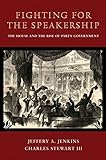Fighting for the Speakership : The House and the Rise of Party Government / Charles Stewart, Jeffery A. Jenkins.
Material type: TextSeries: Princeton Studies in American Politics: Historical, International, and Comparative Perspectives ; 131Publisher: Princeton, NJ : Princeton University Press, [2012]Copyright date: ©2013Edition: Core TextbookDescription: 1 online resource (496 p.) : 22 line illus. 68 tablesContent type:
TextSeries: Princeton Studies in American Politics: Historical, International, and Comparative Perspectives ; 131Publisher: Princeton, NJ : Princeton University Press, [2012]Copyright date: ©2013Edition: Core TextbookDescription: 1 online resource (496 p.) : 22 line illus. 68 tablesContent type: - 9780691156446
- 9781400845460
- Political parties -- History -- United States -- Electronic books
- Political parties -- United States -- History
- POLITICAL SCIENCE / History & Theory
- American political history
- Anti-Lecomptons
- Clerk
- Congress
- Democratic Party
- Democrats
- House of Representatives
- House officer elections
- House officer nominations
- House officers
- John C. Calhoun
- Joseph G. Cannon
- Martin van Buren
- Nathaniel Banks
- Printer
- Reed Rules
- Republican Party
- Second Party System
- Speaker
- U.S. Congress
- Whig Party
- coalition
- committees
- congressional elections
- floor debate
- majority party
- organizational cartel
- organizational control
- organizational politics
- partisanship
- party building
- party caucus
- party strength
- patronage
- political parties
- procedural cartel
- roll call votes
- secret ballot
- slavery
- speakership elections
- speakership
- viva voce voting
- 328.730762 23
- JK1411 .J45 2017
- online - DeGruyter
- Issued also in print.
| Item type | Current library | Call number | URL | Status | Notes | Barcode | |
|---|---|---|---|---|---|---|---|
 eBook
eBook
|
Biblioteca "Angelicum" Pont. Univ. S.Tommaso d'Aquino Nuvola online | online - DeGruyter (Browse shelf(Opens below)) | Online access | Not for loan (Accesso limitato) | Accesso per gli utenti autorizzati / Access for authorized users | (dgr)9781400845460 |
Browsing Biblioteca "Angelicum" Pont. Univ. S.Tommaso d'Aquino shelves, Shelving location: Nuvola online Close shelf browser (Hides shelf browser)
Frontmatter -- Contents -- List of Illustrations -- List of Tables -- List of Abbreviations -- Preface -- Chapter 1. Introduction -- Chapter 2. The Evolving Roles and Responsibilities of House Officers in the Antebellum Era -- Chapter 3. Organizational Politics under the Secret Ballot -- Chapter 4. Bringing the Selection of House Officers into the Open -- Chapter 5. Shoring Up Partisan Control: The Speakership Elections of 1839 and 1847 -- Chapter 6. Partisan Tumult on the Floor: The Speakership Elections of 1849 and 1855-1856 -- Chapter 7. The Speakership and the Rise of the Republican Party -- Chapter 8. Caucus Governance and the Emergence of the Organizational Cartel, 1861-1891 -- Chapter 9. The Organizational Cartel Persists, 1891-2011 -- Chapter 10. Conclusion -- Appendixes -- References -- Index
restricted access online access with authorization star
http://purl.org/coar/access_right/c_16ec
The Speaker of the House of Representatives is the most powerful partisan figure in the contemporary U.S. Congress. How this came to be, and how the majority party in the House has made control of the speakership a routine matter, is far from straightforward. Fighting for the Speakership provides a comprehensive history of how Speakers have been elected in the U.S. House since 1789, arguing that the organizational politics of these elections were critical to the construction of mass political parties in America and laid the groundwork for the role they play in setting the agenda of Congress today. Jeffery Jenkins and Charles Stewart show how the speakership began as a relatively weak office, and how votes for Speaker prior to the Civil War often favored regional interests over party loyalty. While struggle, contention, and deadlock over House organization were common in the antebellum era, such instability vanished with the outbreak of war, as the majority party became an "organizational cartel" capable of controlling with certainty the selection of the Speaker and other key House officers. This organizational cartel has survived Gilded Age partisan strife, Progressive Era challenge, and conservative coalition politics to guide speakership elections through the present day. Fighting for the Speakership reveals how struggles over House organization prior to the Civil War were among the most consequential turning points in American political history.
Issued also in print.
Mode of access: Internet via World Wide Web.
In English.
Description based on online resource; title from PDF title page (publisher's Web site, viewed 30. Aug 2021)









